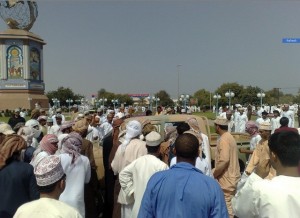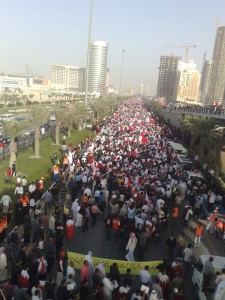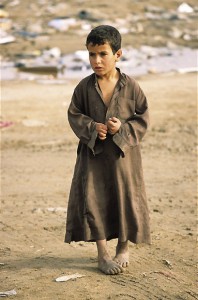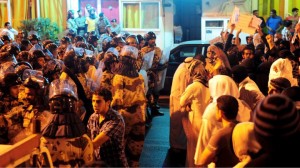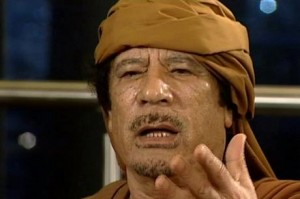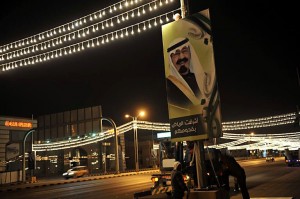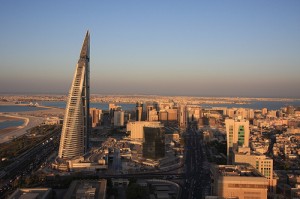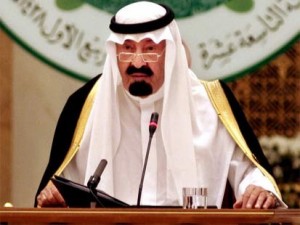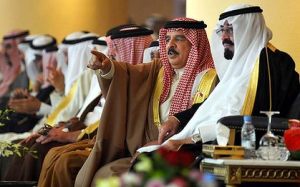
‘Melodrama” and ”Middle East” are words that sit comfortably in the same sentence. But who would have thought, as the world thrilled to the peaceful revolt by millions of ordinary Tunisians in January, that just three months later two of the region’s bad-cop regimes - Riyadh and Tehran - might be seen to be verging towards war?
They are on snarling terms already. Amid the clamour for rights and reform across the Middle East and North Africa, the irony of these heavyweights coming to blows is that each is as repressive as the other - but none of that will stop the rest of the region, and the world, lining up to take sides.
For now it’s a cold war, fought by proxies elsewhere. In Lebanon, the Saudi-backed Sunnis have lost significant ground to the Iranian- and Syrian-backed Hezbollah, which now controls the levers of power in Beirut.
In the current crises, Riyadh and Tehran face-off in Bahrain - Tehran is backing the majority Shiites; Riyadh had thrown its lot in with the minority Sunni monarchy, as it attempts to smash the protest movement. And Yemen, on the Saudis’ southern border, is the most likely next point of friction between the two.
Historically, they have pulled in opposite directions. Saudi Arabia is Arab and Sunni; Iran is Persian and Shiite. Both invest hugely in spreading their beliefs to the farthest corners of the Muslim world. Iran lines up with the so-called Arab rejectionists - Syria, Hezbollah and Hamas. The Saudis line up with Egypt, Morocco, the Gulf statelets and the Palestinian Fatah faction. Riyadh pulls with Washington; Tehran against.
”The cold war is a reality,” a senior Saudi official told The Wall Street Journal. ”Iran is looking to expand its influence. The instability over the last few months means that we don’t have the luxury of sitting back and watching events unfold.”
How that plays out will be intriguing in what has become a ”yes, but …” geopolitical, global crossroads. The permutations tantalise. If the Damascus regime of Bashar al-Assad collapses, what are the implications if the Syrian alliance with Tehran fractures? What becomes of Syria’s joint sponsorship, with Iran, of Hezbollah in neighbouring Lebanon and of Hamas in the Palestinian Occupied Territories?
All these are ”yes, but …” issues, as much for Damascus as for Tehran. Given that Syria remains, technically at least, at war with Israel, can we assume that any new order in Syria would rush to throw over Hezbollah and Hamas? Even Israel, as much as it loathes the Tehran-Damascus-Hezbollah-Hamas quartet, is wary of who and what might replace Assad in the Syrian capital, because just as the interim regime in Cairo is shifting away from the ousted regime’s alliance with Israel, there is no guarantee that a new Syrian leadership will be any friendlier to Tel Aviv.
What if Syria dumped Iran as an ally - but was to pick up expansionist Turkey as a new best friend in the region? Likewise, how might the regional balance be altered if Tehran was to lose Damascus as an ally, but in turn was to pick up Shiite-controlled Iraq and liberated Egypt, which this week revealed that it was resuming diplomatic relations with Tehran?
The official spokesman for the Egyptian Foreign Ministry told reporters: ”We are prepared to take a different view of Iran; the former regime used to see Iran as an enemy, but we don’t.” Similarly, the ministry confirmed that new Foreign Minister, Nabil Elaraby, was considering a visit to the Hamas-controlled Gaza Strip. As a return on the Americans’ huge blood-and-treasure investment in deposing Saddam Hussein and thereby delivering Iraq from minority Sunni control to a majority Shiite government that is becoming increasingly relaxed and comfortable in its dealings with Tehran, the US has handed the Iranian regime a rare gift. Yes, the ayatollahs might lose Syria as their Arab champion, but here is Arab Baghdad and Washington’s lock-step ally Cairo beckoning Tehran with open arms.
The Saudis are furious with Washington over the loss of Sunni control of Iraq and over Barack Obama selling out the Egyptian leader, Hosni Mubarak. Such is the chill between the two countries that Riyadh recently refused official visits by the US Secretary of State, Hillary Clinton, and by the Defence Secretary, Robert Gates. A measure of Saudi determination - maybe that should be ”desperation” - is that when Riyadh saw a need to quell the unrest in Bahrain, it ignored pleas from Washington and sent its own troops over the causeway that links Bahrain to the kingdom.
This is a regime that ordinarily pays others to fight its battles - see its funding of Iraq in its 1980s war with Iran; or has relied on allies - see American wars against Saddam Hussein in 1991 and in 2003.
Ramping it all into a religious conflict, a senior Saudi official was quoted: ”King Abdullah has been clear that Saudi Arabia will never allow Shia rule in Bahrain - never.” In turn, Iran’s President, Mahmoud Ahmadinejad, has warned the House of Saud that it ”should learn from Saddam’s fate”.
The stakes for the US are huge - a third of its imported oil comes from Saudi Arabia, and Bahrain hosts the US Navy’s Fifth Fleet, which patrols vital sea lanes through which a fifth of the world’s oil supplies are shipped. Equally, Riyadh and other capitals in the region have openly speculated on pursuing their own nuclear programs, if Tehran is allowed to persist with its program.
The story of the Washington response to all of this is circuitous.
The Western military intervention in Libya is dressed up as a humanitarian act, but don’t be fooled, writes Robert Kaplan of the Centre for a New American Security in The Wall Street Journal. Arguing that in foreign policy all moral questions are really questions of power, Kaplan observes: ”We intervened twice in the Balkans in the 1990s, only because Yugoslav dictator Slobodan Milosevic had no nuclear weapons and could not retaliate against us; unlike the Russians, whose destruction of Chechnya prompted no thought of intervention on our part.”
Was that then the rationale for Washington’s decision to throw its superpower weight behind the Libyan intervention? Not entirely - orchestrated leaks from the Obama White House reveal that a critical element in the decision to join the attacks on Libya’s leader, Muammar Gaddafi, was the message such an action would send to Tehran.
As reported by The New York Times, failure to act against Libya would be seen by Tehran as a failure by Obama to follow through on his claim that Gaddafi had ”lost the legitimacy to lead”, as a confirming sign of weakness that Obama also would not follow through on his vow that he would never allow Iran to build a nuclear weapon.
Benjamin Rhodes, a senior aide present for the talks, was quoted: ”The ability to apply this kind of force in the region this quickly - even as we deal with other military deployments in Iraq and Afghanistan - combined with the nature of this broad coalition, sends a very strong message to Iran about our capabilities, militarily and diplomatically.”
In a broadcast translated into Persian and beamed into Iran to mark last month’s Persian new year, Obama told Iranians: ”So far, the Iranian government has responded by demonstrating that it cares more about preserving its own power than respecting the rights of the Iranian people. These choices do not demonstrate strength, they show fear.”
In this context Libya is presented as a sideshow. The real contest is with Tehran, which the Americans want to see stopped in its nuclear tracks - and whose tilt for the balance of power in the entire region they have blocked.
But the Arab uprisings were something of a get-out-of-jail-free card for Iran. In January, Washington was happy in the belief that it was boxing Tehran in with economic sanctions; a deal with Russia to halt weapons deliveries to Tehran; and a computer virus called Stuxnet, which was eating its way through the centrifuge machines in the Iranian uranium enrichment program.
Fast-forward to the present, and Washington’s Arab allies are more preoccupied with their own longevity and - ka-ching, ka-ching - Iran is doing better than the sanctions might have allowed, thanks to the crises in the region driving oil to $US100-plus a barrel.
In all of this, Washington’s key ally in the region was to be Riyadh. But the contempt for the US coming out of the Saudi capital is visceral - in the view of the princes, the Bush administration botched by toppling Saddam, thereby delivering Iraq to Tehran; and the Obama administration is condemned equally for selling out Mubarak, and allowing the grubby rank-and-file Egyptians to have a meaningful vote.
In these twin efforts, Washington is seen to have dislodged two great stones in what was a Sunni wall that effectively thwarted Iranian ambition. Likewise, in refusing to go along with Saudi efforts to resolve the Palestinian crisis, Riyadh saw Washington prolonging the issue that Iran used to great effect in stirring the Arab street.
Washington, it must be noted, does not have a mortgage on hypocrisy in the region. The Americans look morally bankrupt - leading the charge against Gaddafi and dumping long-standing allies Mubarak in Cairo and Zine El Abidine Ben Ali in Tunis, while at the same time allowing the leaders of Bahrain, Yemen and Syria to get away with murder in confronting protesters.
But, like the US, the Iranian ayatollahs are into picking winners and losers. Initially they simply ignored the growing unrest in allied Syria, but when that became unsustainable, they took to casting the demonstrations against Assad as the work of Israeli-trained provocateurs.
The revolts in Tunisia and Egypt, according to the Tehran spin, were belatedly inspired by Iran’s 1979 revolution. And while it champions the ”Islamic awakening” rights of the demonstrators who are being brutalised by the regime in neighbouring Bahrain, it whitewashes out of the equation its own brutal suppression of Iranians who have attempted to revive the mass protests that erupted in the wake of Iran’s disputed presidential election in 2009.
For the mullahs, the region’s uprisings are a day-by-day proposition. They might posture endlessly about the holy Shiite suffering in Bahrain, but they know - and they know that their people know - the revolts in Tunisia and in Egypt were a secular lunge for a kind of democracy which, if successful, will make their theocracy a sad venture by comparison.
But for now, Iranian security forces have arrested opposition leaders and tightened media censorship and control of the internet and social media. In the region, the Iranian leadership observes a greater level of difficulty for Washington in achieving the three elements of its regional policy - a region from which the oil flows freely; in which Israel is protected; and in which citizens enjoy basic human rights, or at least to the extent that they do not attack US interests, as expressed by Thanassis Cambanis, of Columbia University. Or, to quote the Hillary Clinton lexicon - ”stability”.
As they happily crack the heads of the few who dare to take to the streets in Iranian cities, the mullahs cannot believe the Sunni Saudis were mug enough to send forces into Bahrain to put down an uprising by Shiites.
Despite endless complaints from Riyadh, there has been little to substantiate its claims that Iran is deliberately manipulating events in Bahrain - even US diplomats have reported no signs of Iranian intervention in the Bahraini protests.
It was only after the Bahraini regime unleashed its brutal attacks on demonstrators that posters of the Hezbollah leader, Hassan Nasrallah, appeared in the crowds and that calls were made for the ousting of the royal family. Iran did beam broadcasts of Nasrallah’s speeches into Bahrain, but foreign diplomats back the protest leaders’ denial of claims by the regime that they have received money and weapons from Tehran.
For the Saudis, the uprisings are a horrific moment. Abutted by all of Jordan, Yemen, Iraq and Bahrain, Riyadh views the varying degrees of unrest in all four as a threat to its own stability. Others agree.
Kaplan grinds all this into a single, core question for Washington: ”Which regime [will last] longer: Saudi Arabia’s or Iran’s? If the Saudi monarchy turns out to have more staying power, we will wrest a great strategic victory from this process of unrest; if Iran’s theocracy prevails, it will signal a fundamental eclipse of American influence in the Middle East.”
Answers to that question thrown up by some analysts, make the call in Tehran’s favour.
In a joint-paper, Ruth Hanau Santini, of the Brookings Centre on the US and Europe, and Emiliano Alessandri, of the German Marshal Fund, see the balance of power in the Persian Gulf shifting in Iran’s favour, ”just as it did in 2003, with the US-led war in Iraq”.
They write: ”Regional power shifts, rising oil prices and progress in its nuclear program all seem to have combined to boost Iran’s external ambitions.
”The authority of Saudi Arabia, which has long served as a counterbalance to Iran, the bastion of regional stability, and the guarantor of Israel’s survival, has been severely weakened by the ongoing turmoil.”
Reviewing Washington’s options, the paper concludes: ”Iran’s calculus that the current level of unrest will turn to Tehran’s advantage, without it having to lift a finger, makes it an especially difficult interlocutor.”
By Paul McGeogh




